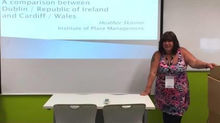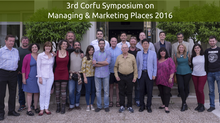Reflections on the 1st Corfu Symposium on Managing and Marketing Places
- Oct 8, 2014
- 4 min read

When I decided to establish this event, a number of decisions were taken along with input from the 1st event's co-organisers very early on in our planning:
That it would be ‘outcome-focused’ on producing results from research initiated from the interaction between academics and practitioners that would result in a wide range of written publication outputs. I could not have been more delighted with the connections that were made at this event, and the planned outcomes that were articulated in the final closing session. I strongly believe that these outcomes will make a real positive difference to the organisations and locations involved, and that the academic outcomes will be of a high quality in terms of published research.
The decision to seek the support of the Institute of Place Management was also vital in not only providing an additional level of credibility to the event, but also in honing our focus on ensuring relevance for both academics and practitioners in place management and place marketing initiatives in the Symposium’s content relevant to its theme.
This Symposium would be an international event – and while there were many delegates from the island of Corfu itself, and quite a lot of discussion focused on place management and marketing issues facing this island, the delegate list shows the truly international nature of this 1st Symposium.
That from Day 1 we would promote it as the 1st Corfu Symposium on Managing and Marketing Places, because we firstly wanted to communicate that we expected this to be the inaugural event in an annual series, and also that the home of the Symposium, regardless of its specific theme, will be in Corfu.
That the Symposium’s social programme, incorporating visits to places of interest relevant to the theme, was to be as much a part of the event as the session content. I think we managed to get this aspect right first time, and so we will stick to this format for future events.
That because the Symposium was to take place just before Easter occurred in both the Orthodox and Catholic calendars, when not everywhere is yet fully ‘open for business’ we would hold the event outside of the main town centre and outside of a major resort. You will see that we have moved the Symposium dates for 2015 to later in the month of April. This helps with a number of issues, not least being that there will be more direct flights to the island from various airports in a range of countries, but also that we will have a wider choice of venues and attractions to include in our programme for 2015.
For those of you who were unable to attend this 1st Corfu Symposium on Managing and Marketing Places, I have included below some of the key discussion themes and planned outcomes arising from this event.
Putting PLACE First
Many places around the world are already at a tipping point and have become unsustainable in their current form and with their current infrastructure and target markets – whether these places are cities, high streets, towns, villages all over the world in which people live, work and play all year round, or tourist destinations that rely heavily on a relatively short season in a world where tourist markets, wants and expectations are changing. Whether developments to effect positive change in these places are strategically led top-down, or emerge from a more grass-roots community led approach, what emerged most strongly from this 1st Symposium on Managing and Marketing Places is that any and all developments must consider the place first and foremost in order to achieve any level of future sustainability, rather than simply revising and refocusing the strategies from the past that have led to the place’s current problems. Many of our discussions centred around the belief that resilience comes out of resistance. In order to become resilient, to become sustainable, to ‘future-proof’ a place, the issue of resistance must be addressed: not only resistance to current structures and dominant models of thinking that drive various initiatives that may not be helpful to a place’s future resilient development, but also the resistance to change that may be evident in a place and its communities.
Image and Identity
Another theme that arose throughout the Symposium was the level of disparity between the way a place identity is promoted, and the way that identity is translated to a place image that is perceived through visual media, stories and histories, cultural heritage, music and song. For many places there is a need for much more research into these two separate but linked issues of identity and image. Various projects and collaborations were identified among delegates to move this theme forward.
Connecting People and Places
The issue of local wine and gastro tourism also aroused a great deal of interest, with a number of collaborations proposed to explore these research areas further, particularly exploring how tourists could connect better to places through engaging with activity holidays, or activities that form part of the overall holiday experience that are based on local food and drink production and consumption.
There was a great deal of interest in furthering exploring how the model of the case study on Arillas could be employed to improve co-operation and effect positive change in other resorts, particularly, but not exclusively on Corfu. As a result of the Symposium, a number of delegates have planned further collaborative research examining aspects of this place management and marketing issue.























Comments